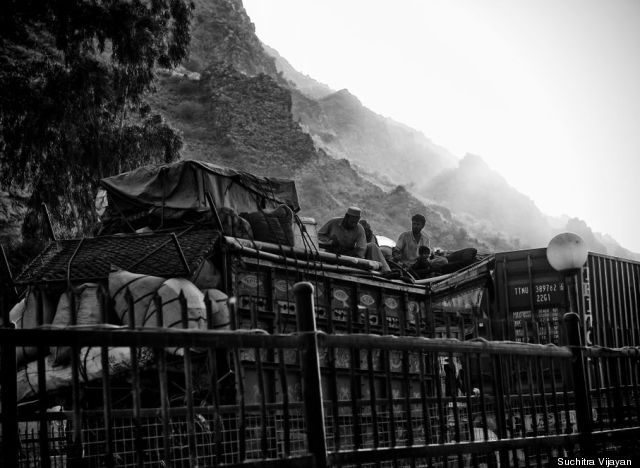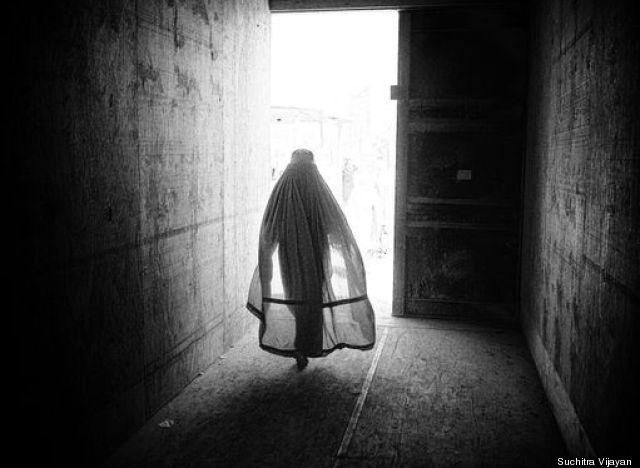
Dislocation is something photographer Suchitra Vijayan is no stranger to. She grew up in India but hasn’t lived there in 11 years, yet she’s often referred to as an Indian photographer. She hates that. We all can get a little disrupted when location defines our identity, especially for those of us who have left our place of origin behind.
Vijayan’s recent work documenting the border of Afghanistan and Pakistan are featured in a photo essay in the latest issue of Huffington. On this work, and her background, she say, “Our history defines who we are and what we carry. Our entire existence is geo-political. We drew lines on a map and we were born. Because I was born on the other side of the border, I was Indian. Our loyalties can be easily changed.”
A former lawyer, Suchitra went to grad school at Yale University where she studied war. Her photography is self-taught and through it, we realize how puny the lines we use to divide us are. Vijayan is not an intense war photographer with her lens set on brutality, yet she is an image-based storyteller with enough sensitivity to try to figure out what all of it means.
Prior to documenting the Afghan-Pakistan border, she captured lives in transition in Haiti. Next on her border crossing agenda is the South Sudan. The common thread that runs through everything Suchitra does is redefining identity. A lover of fiction, Vijayan is engaging in a global shift of geography of the mind. She’s hoping for stories that help position citizens in a world constantly asking where home is, and what that means about who they are.

The landscapes here are beautiful. Afghanistan is beautiful. A lot of people who cover Afghanistan say it’s this untamed landscape. The geography dictates the people. It dictates how they react to things. It dictates what you take for granted. This place is so breathtaking. They don’t get it. It’s easy to discern between what is romantic and admiring a place for the beauty.
Where did your interest in borders come from? The very fact that we have borders is geographical. Our zipcodes define who we are. They are insignificant. The space we occupy defines so much of who we are and perhaps what we are. The music we listen to. The furniture we have. The kind of schools your kids go to. All of that is a border in some sense.
How does the border portral treat you? What do they say? When I got there everyone was curious. Most of the photographers are men. They don’t see south Asian women photographers. They have an overbearing need to protect you. They ask, are you a journalist? Then they want to know where I’m from. Am I married? What am I going to do with these photographs? I’ve had this conversation when I was working in Haiti: 'Why are you dark?' There are different kinds of Indians. Not all Indians are light skinned. It’s a very interesting back-and-forth.

What is going on in this photo? Smuggling is huge problem. It’s conflated by the import/export idea. I’m assuming these are not real Marlboros. He stood there guarding them. He was so proud to be standing next to Western Marlboros. I don’t know what the machoism of this is but every time I would go around, he would proudly pose. Multiple stories can happen based on this one photograph – all of them fiction. It’s great.
Why are all of your images in black and white? It’s an affinity I have for the words black and white. Color always distracts. A lot of photography is a process. I know we live in a world where we have a million images. What is the ubiquity of the image? It’s an answer we are unable to come to. What does the photograph mean? It’s an intellectual process. I don’t indulge in the school of thought where you take a thousand photographs. The illusion of preciseness means that I really thought about it.

What is your favorite picture in the border series? It's the one with the see-through Burkha. The picture just happened. I had an intuition that the light would hit. I like how the image breaks our conceptions of what it means to wear something like this. It’s provocative. It’s seductive. It completely destroys every assumption of what the Afghan woman is. She’s not abused. She’s okay.
What advice would you offer an aspiring photographer? What I create is who I am. It’s about you and what you want to do with you life. The best thing to do is not take advice and make your own mistakes. There are a lot of pontificating already. You’re only as good as your last achievement. You have to keep going. You will grow. If I go back and see the first roll of film you develop, I will be embarrassed. I was so proud. I could do it all. We all grow.
Download the latest issue of Huffington free in the Apple iTunes store every Friday and follow us on Facebook.

